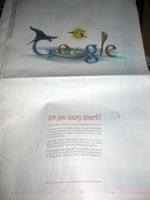
The Madison Food & Wine Show was held this weekend at the Alliant Energy Center. A first time visitor, I found the event enjoyable. Unsurprisingly, there was no shortage of cheese. One of the more interesting offerings was Swiss Valley’s fondue. Whole Foods had an elaborate set of tastings, from Olives to cheeses. The surprise of the show? a knife sharpening service. Photos here. Gail Ambrosius (Dark Chocolate) was also a worthwhile stop. Website with links to vendor’s site.
Daily Archives: October 30, 2005
SBC’s Whitacre on “His Pipes”
SBC, Wisconsin’s largest incumbent telco, evidently does not believe in the open internet. Chairman Ed Whitacre expects internet firms to pay to send content to local customer’s homes (that TV thinking again). Perhaps I’m missing something, but I’ve not seen any SBC Fibre deployed to the home. We’re still using the copper networks, paid for by all of us, during the regulated telecommunications era. Fortunately, I think by the time SBC gets around to fibre (will they?), wireless will perhaps, be pervasive.
The telcos should be investing in personal web services to use these pipes.
Bob Berger has more.
Tea Leaves: Google & Madison Ave: Quid Pro Quo on Advertising?
 |
 |
| Click to view a larger version of each image. | |
Not content to just suck advertising dollars from Web search, Google is using its windfall to pay for an eclectic range of ambitious projects that have the potential to radically disrupt other industries. Among other things, it is offering to build a free wireless Internet network in San Francisco, plans to scan nearly every book published and is testing a free classified advertising system it calls Google Base.
More quietly, Google is also preparing to disrupt the advertising business itself, by replacing creative salesmanship with cold number-crunching. Its premise so far is that advertising is most effective when seen only by people who are interested in what’s for sale, based on what they are searching for or reading about on the Web. Because Google’s ad-buying clients pay for ads only when users click on them, they can precisely measure their effectiveness – and are willing to pay more for ads that really sell their products.
Interestingly, Google placed a full page color ad, seeking advertising sales people, in today’s NY Times Business section. From what I can tell (I subscribe to the fishwrap version of the Times), this is rather rare. John Batelle raises some useful points as well.
Knutsen’s State Street Pepper Spray Halloween Video Clips
Kristian Knutsen, perched at the WSUM studio’s, posts video clips of the pepper spray crowd clearing operation. Dane101 has more, along with Channel3000 and the State Journal.
Ireland’s John Bruton Interview
Q: Last week, we had as our guest Stanford Professor Michael Boskin, chairman of the Council of Economic Advisors to the first President Bush. Boskin invoked an image of Europe of high taxes, high spending, overly generous social welfare networks, high unemployment and stagnant growth as something the United States must avoid at all costs. What is the European view of that critique?
A: If you took each of the 50 states in the U.S., you would find quite different economic performance as between Mississippi and California or as between Washington state or West Virginia. There are varieties in Europe, just as there are varieties here in the United States.
On average, productivity per hour worked is as high in Europe as it is in the United States, right across the board. In some countries like Ireland and the Netherlands, it is higher. However, Europeans work fewer hours. They work fewer hours per year, per week and per lifetime. They retire earlier.
Bruton was formerly Prime Minister of Ireland in the 1990’s.